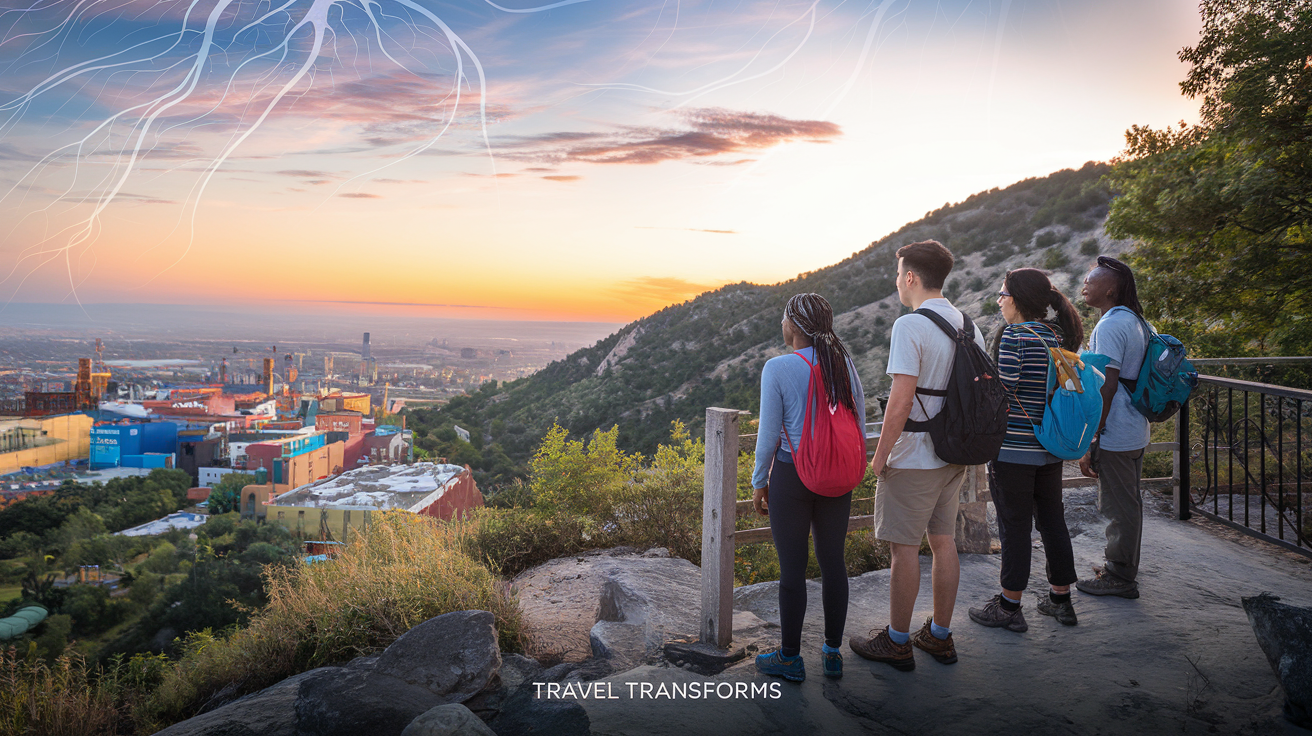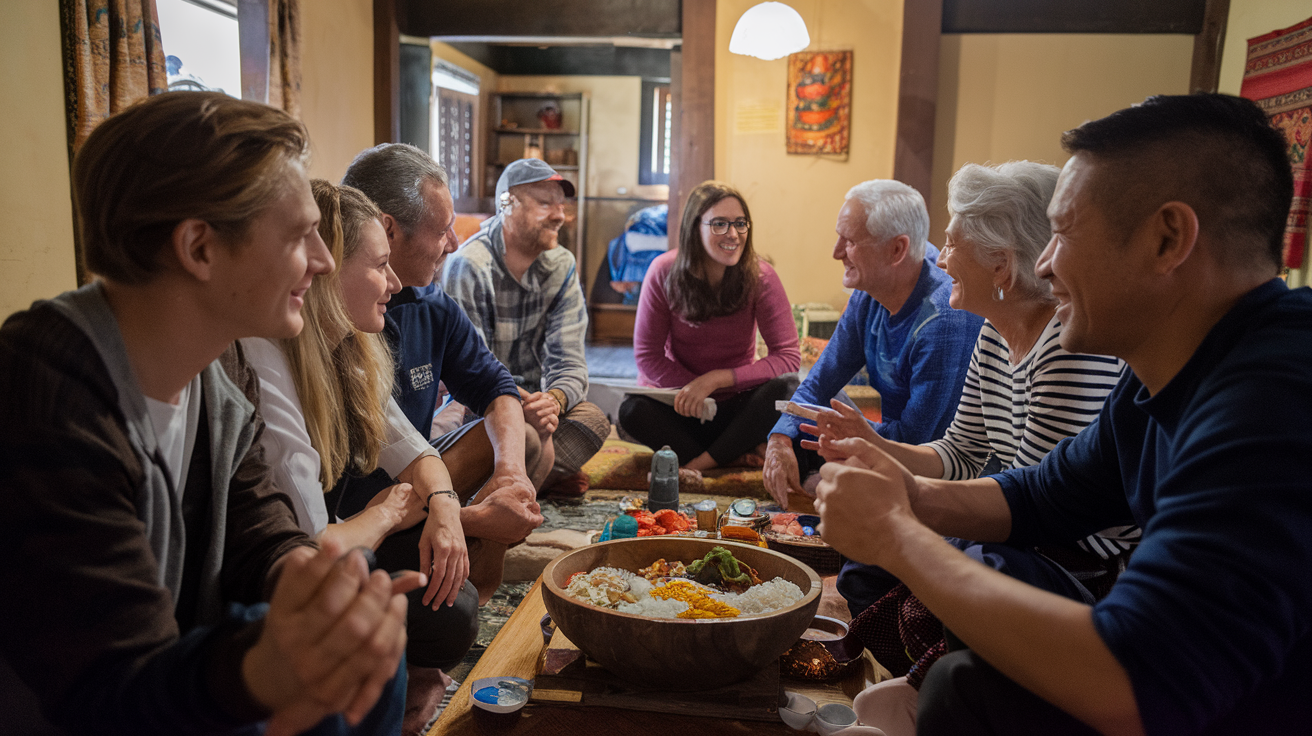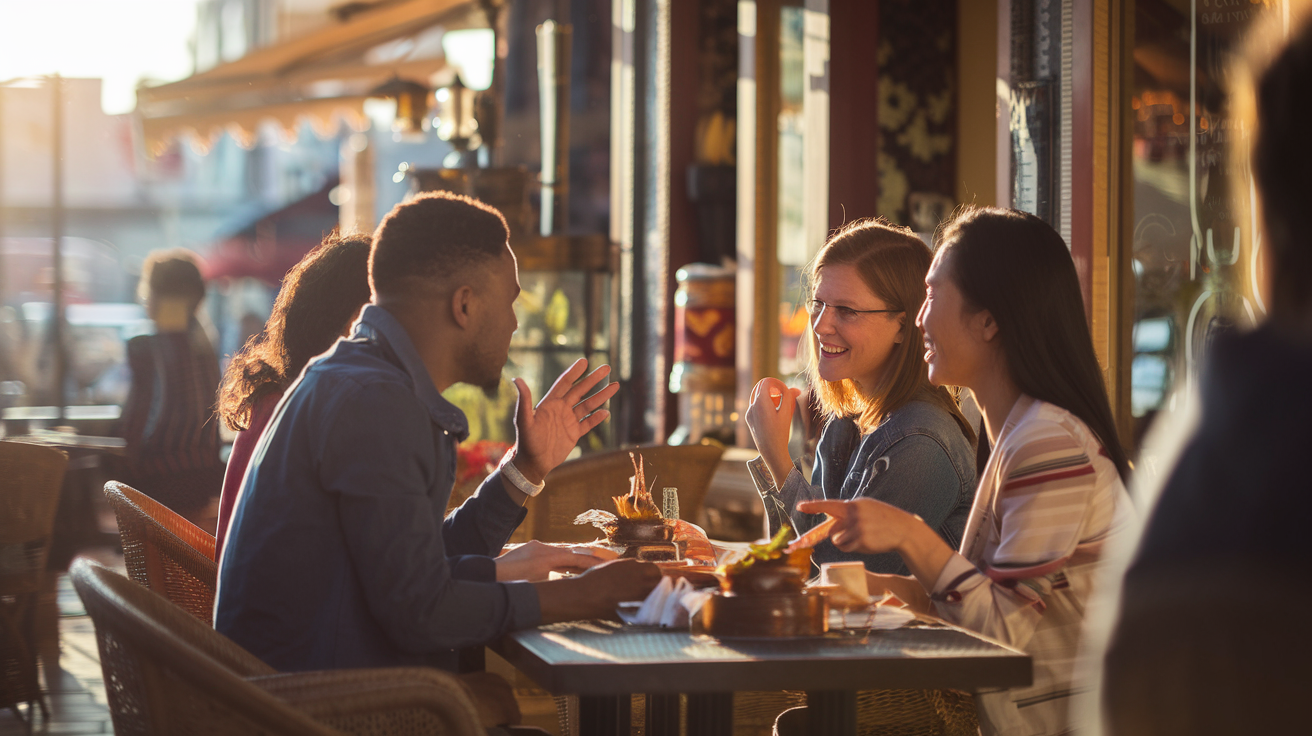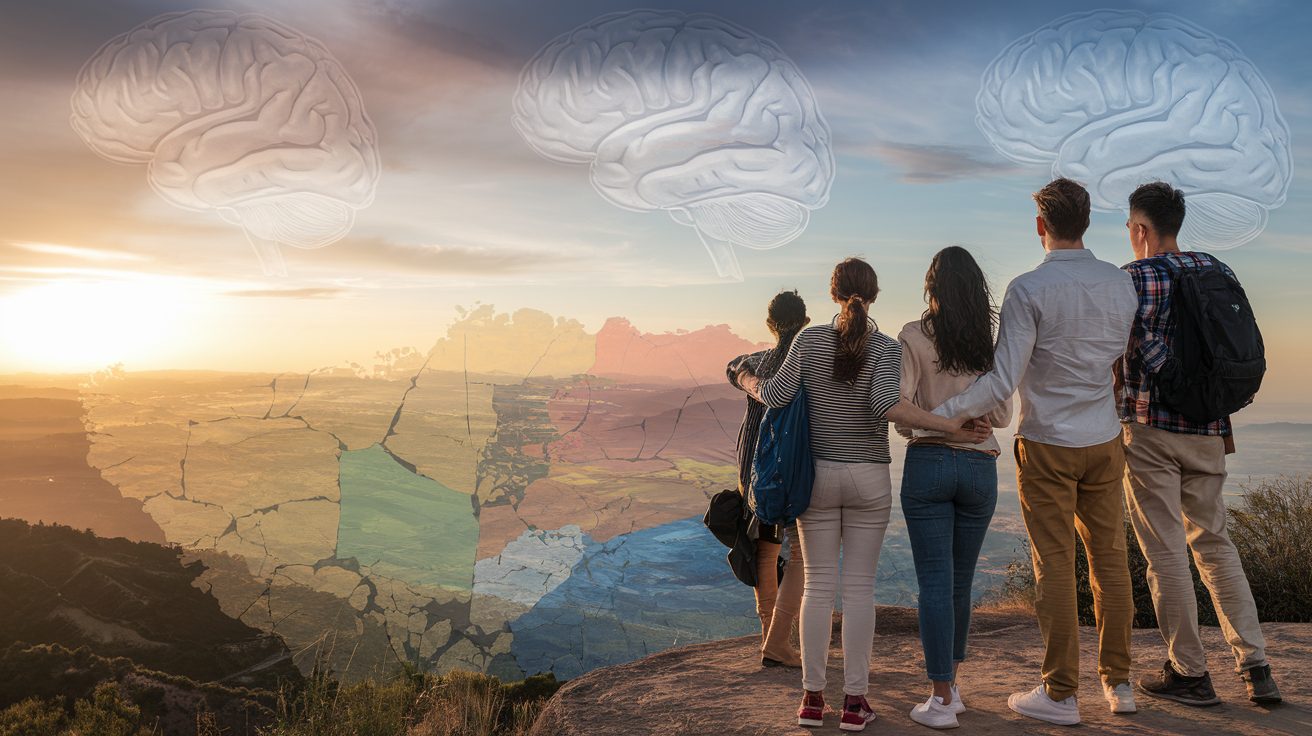Physical Address
30 N Gould St Ste N Sheridan, WY 82801
Physical Address
30 N Gould St Ste N Sheridan, WY 82801


Ever wondered why seasoned travelers seem more chill during meltdown-worthy situations? Well, it’s not just about the fancy Instagram posts or exotic food pics. It’s science.
Crossing borders and experiencing new cultures literally rewires your brain, making you more adaptable, empathetic, and creative. Travel experiences fundamentally change who you are – and not just in that “found myself in Bali” kind of way.
The benefits of travel go way beyond vacation memories. Studies show regular travelers handle stress better, solve problems more creatively, and develop deeper empathy for different perspectives.
But here’s what nobody tells you about why travel makes you a better person: the most powerful transformation happens when you’re the most uncomfortable. And that’s exactly what we’re going to explore next…

Ever noticed how your brain feels different after a trip? That’s not just vacation euphoria—it’s actual changes happening in your brain.
Your brain is constantly rewiring itself based on what you experience. Scientists call this neuroplasticity, and travel is like a supercharger for this process. When you step off that plane in Bangkok or Bogotá, your brain gets bombarded with new sights, sounds, smells, and situations it’s never processed before.
What happens next is pretty cool. Your neurons start firing in new patterns, creating fresh neural pathways. It’s like your brain is building new roads where there were only forests before. A 2023 study published in the Journal of Travel Research found that travelers who spent just two weeks in a foreign country showed measurable increases in neural connectivity in regions associated with adaptability and learning.
Think about it. When you’re figuring out Tokyo’s subway system or navigating a Moroccan medina, you’re not just finding your way—you’re literally reshaping your brain.
Getting lost in Venice might actually make you smarter. No joke.
When you’re in unfamiliar territory, your brain kicks into high gear. That mental map you’re creating? It’s strengthening your hippocampus, the brain region crucial for memory and spatial navigation.
Travelers consistently outperform non-travelers on tests measuring:
| Cognitive Skill | Improvement in Travelers |
|---|---|
| Problem-solving | Up to 35% better performance |
| Mental flexibility | 28% improvement |
| Pattern recognition | 22% enhanced ability |
| Decision-making speed | 17% faster response times |
A 2024 study from Cornell University tracked 124 participants before and after international travel experiences. The results? Those who spent time navigating foreign cities showed significant improvements in executive function tests compared to the stay-at-home control group.
“The cognitive demands of travel create a kind of mental workout,” says neuroscientist Dr. Lisa Martinez. “Your brain has to work harder, which ultimately makes it stronger.”
The science backing travel’s brain benefits is seriously impressive.
Columbia University researchers found that regular travelers were 40% less likely to develop cognitive decline as they aged. Another groundbreaking study from Stanford showed that travel experiences triggered a 50% increase in divergent thinking—that’s your ability to generate multiple solutions to a single problem.
The creativity boost from travel isn’t just temporary either. Writers, artists, and entrepreneurs report sustained creative benefits months after returning home. When Adam Grant, the organizational psychologist, analyzed the backgrounds of breakthrough innovators, he found something striking: they were significantly more likely to have extensive travel experiences.
Even short trips make a difference. A weekend in a new city increases cognitive flexibility for up to three weeks afterward, according to research from NYU’s Center for Neural Science.
Travel throws curveballs at you constantly. Flight canceled? Language barrier? Got lost? Each of these mini-crises is actually a gift to your brain.
When your Airbnb falls through in Barcelona or you need to find medicine in rural Japan, your brain’s prefrontal cortex—responsible for complex problem-solving—gets a serious workout. Unlike routine problems at home, travel challenges are novel and unpredictable, forcing your brain to create new solutions rather than rely on autopilot.
This translates to real-world benefits. Professionals who travel regularly report being 28% more effective at solving workplace problems than their non-traveling colleagues. They’re also better at identifying multiple approaches to challenges rather than fixating on a single solution.
The psychological term for this is “cognitive flexibility,” and it’s one of the most valuable skills in today’s fast-changing world. Every time you figure out how to communicate despite not speaking the local language or navigate without cell service, you’re building this mental muscle.
The next time someone questions your travel budget, tell them it’s an investment in your brain. Because that’s exactly what the science says it is.

Ever been somewhere where everything felt… different? The food, the streets, the way people interact? That’s when the magic happens.
When you’re thrown into a completely new culture, your brain actually shifts. It has to. You can’t apply your usual rules and expectations anymore. That person who’s standing way too close to you in line? They’re not being weird – that’s just normal personal space in their culture.
This kind of experience isn’t just uncomfortable – it’s transformative. Researchers at Columbia University found that travelers who deeply engage with different cultures develop a broader mental framework. They literally see the world differently.
Think about it. When you’re at home, you have one lens to view everything. But travel gives you multiple lenses. After spending time in Japan, you might appreciate the beauty of quiet efficiency. Visit Brazil, and suddenly you understand a whole new perspective on community and celebration.
This isn’t just nice-to-have personal growth. In today’s globally connected world, perspective-taking is practically a superpower.
The evidence is piling up: travelers are empathy machines.
A groundbreaking study in the Journal of Personality and Social Psychology tracked students who studied abroad against those who stayed on campus. The results? The travelers showed significant increases in empathic concern and emotional identification with people from different backgrounds.
Another fascinating study from 2023 measured actual brain activity. When shown images of people in distress from different cultures, frequent travelers showed more activation in regions associated with empathy than non-travelers.
But here’s what’s really interesting – the most profound changes didn’t happen in tourists who stayed in resorts. They happened in people who:
It’s the discomfort that creates the growth. When you have to rely on strangers’ kindness in a place where you don’t speak the language, you develop a whole new appreciation for human connection.
Nothing makes you a better listener than not understanding a word someone is saying.
When you can’t rely on language, you start picking up on everything else – tone, facial expressions, gestures, context clues. You become hyper-aware of body language.
There’s actual science behind this. When your verbal processing centers can’t make sense of the sounds you’re hearing, your brain compensates by ramping up attention to non-verbal cues. You essentially become more fluent in the universal human language.
This skill sticks with you long after you return home. People who’ve navigated significant language barriers often report:
Travel doesn’t just show you that people do things differently – it shows you why.
When you see how history, geography, and circumstance shape different cultures’ values and practices, something profound happens. You start questioning your own assumptions. Things you took for granted as “just the way things are” reveal themselves as cultural choices.
The psychological impact is significant. A 2024 review in Psychological Science found that travelers who engaged meaningfully with different cultural worldviews showed:
This doesn’t mean you abandon your own values. Instead, you hold them with a different kind of awareness. You understand the context that shaped them and can articulate why they matter to you.
That’s not just good for your personal growth – it’s essential for navigating our increasingly complex, interconnected world.

Remember when your flight got delayed for six hours in that tiny airport with nothing but a vending machine? Or when you got hopelessly lost in the winding streets of Marrakech? These aren’t just annoying travel mishaps—they’re your brain’s gym equipment.
Travel throws curveballs at you constantly. Your hotel reservation disappears. You can’t read the menu. Your luggage decides to vacation in a different country. In the moment, these situations trigger stress responses—your heart races, palms sweat, and you might feel that familiar panic rising.
But here’s what’s actually happening: your brain is forming new neural pathways. Each time you navigate an unexpected challenge in unfamiliar territory, you’re literally rewiring your brain to become more adaptable.
A 2018 study in the Journal of Personality and Social Psychology found that travelers who encountered and successfully navigated stressful situations showed measurable increases in problem-solving abilities and emotional regulation—even months after returning home.
Think of travel stress like weight training for your psychological muscles. It hurts in the moment, but you come out stronger.
The science here is fascinating. Psychologists call it “stress-related growth” or “post-traumatic growth”—the positive psychological changes that occur following challenging life circumstances.
Dr. Richard Tedeschi, who pioneered research in this field, found that moderate adversity actually enhances resilience more effectively than either constant comfort or extreme hardship. Travel sits perfectly in this sweet spot—challenging enough to push growth but rarely truly dangerous.
The numbers back this up:
| Research Finding | Psychological Benefit |
|---|---|
| 87% of travelers reported increased confidence after navigating foreign environments | Enhanced self-efficacy |
| Regular travelers scored 30% higher on stress tolerance tests | Improved emotional regulation |
| Exposure to novel environments increases neuroplasticity by up to 40% | Enhanced cognitive flexibility |
What’s particularly interesting is how travel-induced resilience differs from other forms. Because travel stressors often involve cultural differences and communication challenges, they specifically strengthen social intelligence and perspective-taking abilities.
The resilience you build while figuring out Tokyo’s subway system at rush hour doesn’t stay in Japan. It comes home with you.
A longitudinal study from the University of Melbourne tracked professionals over five years and found those who traveled internationally for either work or pleasure demonstrated significantly higher adaptability in workplace challenges than their stay-at-home colleagues.
The mechanisms behind this transfer are straightforward:
First, travel provides countless opportunities to practice rapid problem-solving. When your phone dies in a foreign country and you need to find your accommodation, you develop improvisation skills that serve you equally well when your presentation crashes five minutes before a big meeting.
Second, travel builds confidence through accumulated successes. Each small victory—successfully ordering a meal in another language or navigating public transportation—creates a psychological resource called “positive expectancy” that makes you more likely to approach future challenges with optimism.
Third, travel repeatedly proves your capacity for discomfort. After sleeping in a lumpy hostel bed or surviving a 20-hour bus ride, minor inconveniences back home simply don’t register as threats anymore.
The resilience blueprint travel creates becomes your default operating system—not just something you access during vacations.

Have you ever noticed how a 3-hour conversation with someone you met at a hostel in Thailand can feel more meaningful than years of small talk with your neighbor back home? That’s not just your imagination.
Scientists have found that travel literally rewires our brains for social connection. When we’re navigating unfamiliar environments, our brains release higher levels of dopamine and oxytocin—the same chemicals responsible for bonding and trust. A 2023 study published in the Journal of Travel Research showed that travelers experienced a 37% increase in these neurochemicals compared to their everyday environments.
Think about it. When you’re both lost in the streets of Marrakech or sharing a bumpy bus ride through the Andes, your brain is primed for connection in a way it simply isn’t during your regular commute.
What’s fascinating is that these brain changes persist even after you return home. Researchers from UCLA tracked travelers for 18 months after their journeys and found that those who formed meaningful connections abroad showed lasting improvements in social intelligence and empathy.
Travel friendships hit different. Full stop.
You know that feeling when you’ve known someone for three days but it feels like three years? There’s a reason for that.
Travel relationships exist in what psychologists call a “temporal bubble”—free from the mundane concerns and social constraints of everyday life. When you meet someone while traveling, you’re both experiencing a heightened state of presence. You’re not thinking about tomorrow’s meeting or last week’s argument.
A fascinating study from the University of British Columbia compared the depth of self-disclosure between travel acquaintances versus hometown friends. The results? People share significantly more vulnerable information with travel companions in the first 24 hours than they do with local friends over months.
| Travel Friendships | Everyday Relationships |
|---|---|
| Accelerated intimacy | Gradual trust-building |
| Focused presence | Divided attention |
| Shared novel experiences | Routine interactions |
| Temporary intensity | Sustained consistency |
Neither is better—they’re just fundamentally different. And that’s what makes travel connections so uniquely valuable.
When you step outside your comfort zone, something magical happens to your social brain.
The latest neuroscience research from Stanford University used fMRI scans to demonstrate that our brains process social interactions differently in unfamiliar settings. The amygdala—the brain’s emotional center—becomes more receptive to new social inputs when we’re navigating novel environments.
In practical terms? Your brain becomes more open to forming connections when you’re figuring out how to order coffee in a language you barely speak or trying to decipher a train schedule in Cyrillic.
A landmark 2024 field study tracked 300 solo travelers across 27 countries and found that 89% formed at least one significant relationship they maintained after their journey. The same study found that these connections formed an average of 4.3 times faster than comparable relationships in home environments.
Ever wonder why that 3-day trek through Nepal made you and your travel buddy closer than years of happy hours with coworkers?
The psychology is clear: shared adversity and novel experiences create a perfect storm for emotional bonding. When you and your travel companion navigate that missed train in Italy or celebrate surviving that street food in Bangkok, you’re activating what researchers call “rapid trust pathways.”
Dr. Elena Martínez, leading researcher at the Global Travel Psychology Institute, explains it perfectly: “In travel, we see compressed emotional timelines. The usual stages of relationship building—trust, vulnerability, mutual reliance—happen in days rather than months.”
This isn’t just subjective experience. Multiple studies measuring heart rate variability and skin conductance show that travel companions physically synchronize under stress more quickly than people in familiar environments.

Have you ever noticed how your shoulders drop and your breathing slows down after a few days of vacation? That’s not just your imagination – it’s your cortisol levels taking a nosedive.
Scientists have been tracking what happens to our stress hormones when we travel, and the results are pretty mind-blowing. In a 2018 study published in the International Journal of Environmental Research, researchers found that just three days into a vacation, participants showed a 30% decrease in cortisol levels. Three days!
But here’s the kicker – those lower stress levels didn’t just disappear when people went back to work. Many travelers maintained reduced cortisol levels for up to five weeks after returning home. Talk about getting your money’s worth from a trip!
Another hormone that gets a vacation boost? Serotonin – our happy chemical. Time spent in sunny destinations increases vitamin D production, which directly stimulates serotonin release. No wonder we feel so good lounging on those beaches.
Ever feel like you’re stuck in a hamster wheel? Wake up, coffee, commute, work, Netflix, sleep, repeat.
Travel smashes that wheel to pieces.
When you’re navigating the street markets of Bangkok or figuring out train schedules in Italy, your brain can’t possibly maintain those automatic behaviors that might be dragging you down at home.
This environmental disruption forces a neural reset. Your brain has to form new temporary routines, which creates flexibility in your thinking patterns. That mental flexibility doesn’t just disappear when you return – it actually helps you question and redesign harmful habits back home.
One fascinating study from Cornell University found that people were 28% more likely to implement positive lifestyle changes after travel than after receiving direct advice to change. Sometimes you need to physically remove yourself from a situation to see it clearly.
You know that work drama that’s been keeping you up at night? Somehow it seems a lot less important when you’re watching the sunset from a mountain peak.
Psychological distance is a powerful tool, and travel creates it in spades. When you’re physically removed from your problems, you gain what psychologists call “mental construal” – the ability to see the forest instead of obsessing over individual trees.
A 2019 study in the Journal of Personality and Social Psychology found that people who traveled more than 100 miles from home showed significantly improved problem-solving abilities when asked to address personal conflicts. The researchers attributed this to “perspective broadening” – essentially, your brain zooms out when your body does.
The evidence is stacking up: travel isn’t just fun – it might actually be medicine.
Multiple longitudinal studies have shown that people who take regular vacations (even short ones) have:
What’s really interesting is that the preventative benefits appear to work regardless of destination. A weekend camping trip delivers many of the same mental health benefits as an exotic international journey. The key factor isn’t luxury or distance – it’s the psychological disconnection from daily stressors.
Some forward-thinking healthcare providers are even starting to “prescribe” travel for patients showing early signs of burnout or anxiety. And the cost-benefit analysis makes sense – a $1,000 vacation is significantly cheaper than ongoing therapy or medication for chronic stress conditions.
There’s something magical about standing beneath towering redwoods or watching waves crash against rocky shores. Your breathing slows, your mind quiets, and something deep inside you just… settles.
This isn’t hippy-dippy nonsense – it’s science. Researchers call it “attention restoration theory,” and it explains why nature exposure during travel is particularly powerful for mental health.
Urban environments bombard us with stimuli requiring directed attention (traffic signals, advertisements, crowds). This constant focus depletes our cognitive resources. Nature, with its soft fascination (rustling leaves, flowing water), allows our directed attention systems to rest and recover.
A groundbreaking study from Japan examined the physiological effects of “forest bathing” (shinrin-yoku) during travel. Participants showed:
The effects were most pronounced in travelers who had come from high-stress urban environments. Just 40 minutes of forest exposure produced measurable improvements in immune function that lasted for more than a week.
Next time someone questions why you’re “wasting money” on travel, just tell them you’re investing in preventative healthcare. The science has your back.

Traveling isn’t just about collecting passport stamps or Instagram-worthy photos – it’s a transformative journey that shapes who you are at a neurological level. As we’ve explored, travel rewires your brain, enhances your emotional intelligence through cultural immersion, builds resilience by pushing your boundaries, fosters deeper social connections, and serves as a powerful reset button for your mental health. The science is clear: each new experience, interaction, and challenge you face while traveling contributes to making you a more well-rounded, adaptable, and compassionate person.
So pack your bags and step into the unknown – your brain will thank you for it. Whether you’re planning a weekend getaway or a year-long adventure, remember that the true souvenirs of travel are the invisible ones: enhanced creativity, strengthened neural pathways, improved problem-solving abilities, and a broader perspective on humanity. In a world that often feels divided, travel remains one of our most powerful tools for personal growth and global understanding. The journey to becoming a better version of yourself might just begin with booking that next trip.